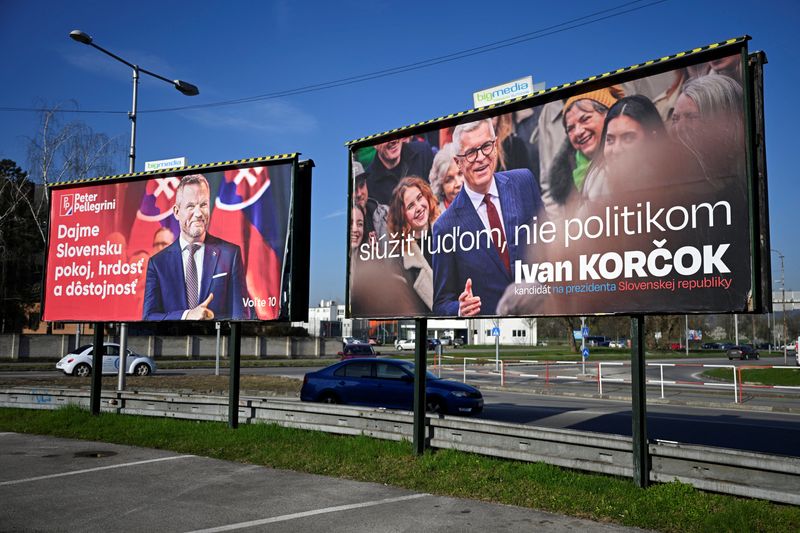
©Reuters. Election posters show Slovakian presidential candidates Peter Pellegrini and Ivan Korcok before the presidential elections, in Trencin, Slovakia, March 22, 2024. The posters read: ‘Let’s give Slovakia peace, pride and dignity’ (Peter Pellegrini) and ‘To ser
2/5
By Radovan Stoklasa and Jason Hovet
BRATISLAVA (Reuters) – A former pro-EU Slovakian foreign minister was on course to score a surprise victory in the first round of Saturday’s presidential election, setting up a run-off with a key ally of populist Prime Minister Robert Fico.
Slovakia’s presidential election presents an opportunity for Fico, whose views on Ukraine have angered critics for getting too close to Russia, to tighten his grip on power.
The war in Ukraine, high inflation and chaotic governance under an opposition-led coalition in the 2020-2023 period have polarized the debate in NATO and European Union member states.
The government’s attempts to revamp the country’s criminal laws and limit media freedom have also led to a series of protests and criticism from President Zuzana Caputova, 50, who has been a fierce opponent of Fico but has not sought a new mandate.
Ivan Korcok, 59, foreign minister in a previous government, won 41.2% of the vote in the first round after 94% of districts reported, according to statistics office data.
Projections by news site Dennik N show Korcok advancing to a run-off on April 6 against Peter Pellegrini, 48, the parliament speaker who heads the ruling junior Hlas (Voice) party. Pellegrini obtained 37.9% of the incomplete votes.
A Russian-leaning former Supreme Court chief, Stefan Harabin, won the third-most votes with just under 12%, after winning the support of a nationalist party that is also in the governing coalition. His voters could give Pellegrini a boost in the runoff.
Fico and his ruling left-wing Smer party won parliamentary elections last September on a pledge to suspend military aid to Ukraine and maintain support for people affected by the price spike.
Pellegrini, a former prime minister and former Smer member, was a key figure in the formation of the coalition.
Korcok is trying to block the government from obtaining the office of president, a position that does not wield many executive powers but has a role in government and judicial appointments, vetoes laws and shapes public debate as the liberal Caputova has often done.
Voters in the past have often refused to award both government and presidential positions to the parties in power. Caputova won the last presidential elections in 2019, riding the anti-corruption wave aimed at Fico’s party, then in power.
“These elections will show whether the mass protests that have taken place in Bratislava and other major cities in recent weeks are also supported by people who usually express their disapproval at polling stations,” said Radoslav Stefancik, a political analyst at the University of Economy of Vienna. Bratislava, the capital.
DIVIDED VIEWS ON UKRAINE
Opinion polls before Saturday showed Pellegrini as the likely winner in the run-off with Korcok.
“(The people) know what I stand for… Now it’s their decision,” Korcok said after casting his vote Saturday.
Fico suddenly changed parts of Slovakia’s foreign policy, ending state military supplies to Ukraine – while allowing commercial supply deals – and opening dialogue with Moscow even as the EU isolates the Russian regime.
Pellegrini has said Slovakia will remain anchored in the EU and NATO but, like Fico, says the conflict in Ukraine has no military solution and supports peace talks between Kiev and Moscow – a position that Korcok and other critics say is capitulation when parts of Ukraine are occupied.
Fico’s coalition government has pushed through changes to criminal law that critics say weaken the fight against corruption. Caputova, as president, challenged the changes in the Constitutional Court.
This week the government’s decision to close a state judicial unit dedicated to corruption was heavily criticized by the European Commission.
The Fico administration is planning changes that will give it greater control over public broadcaster RTVS, raising concerns among press freedom advocates. Korcok criticized the government’s push for greater powers.